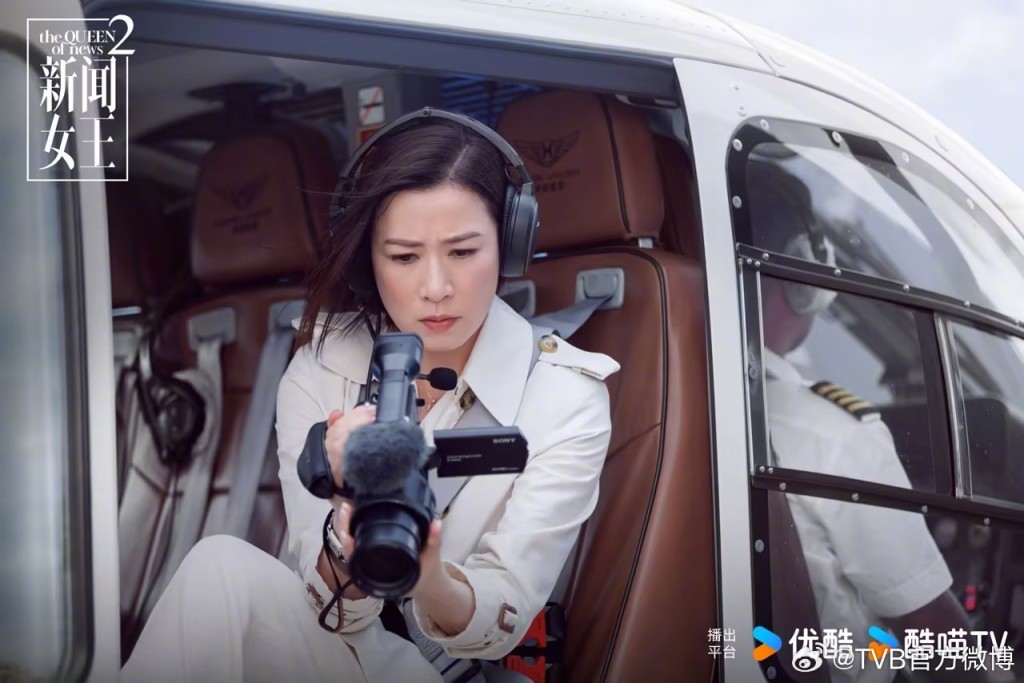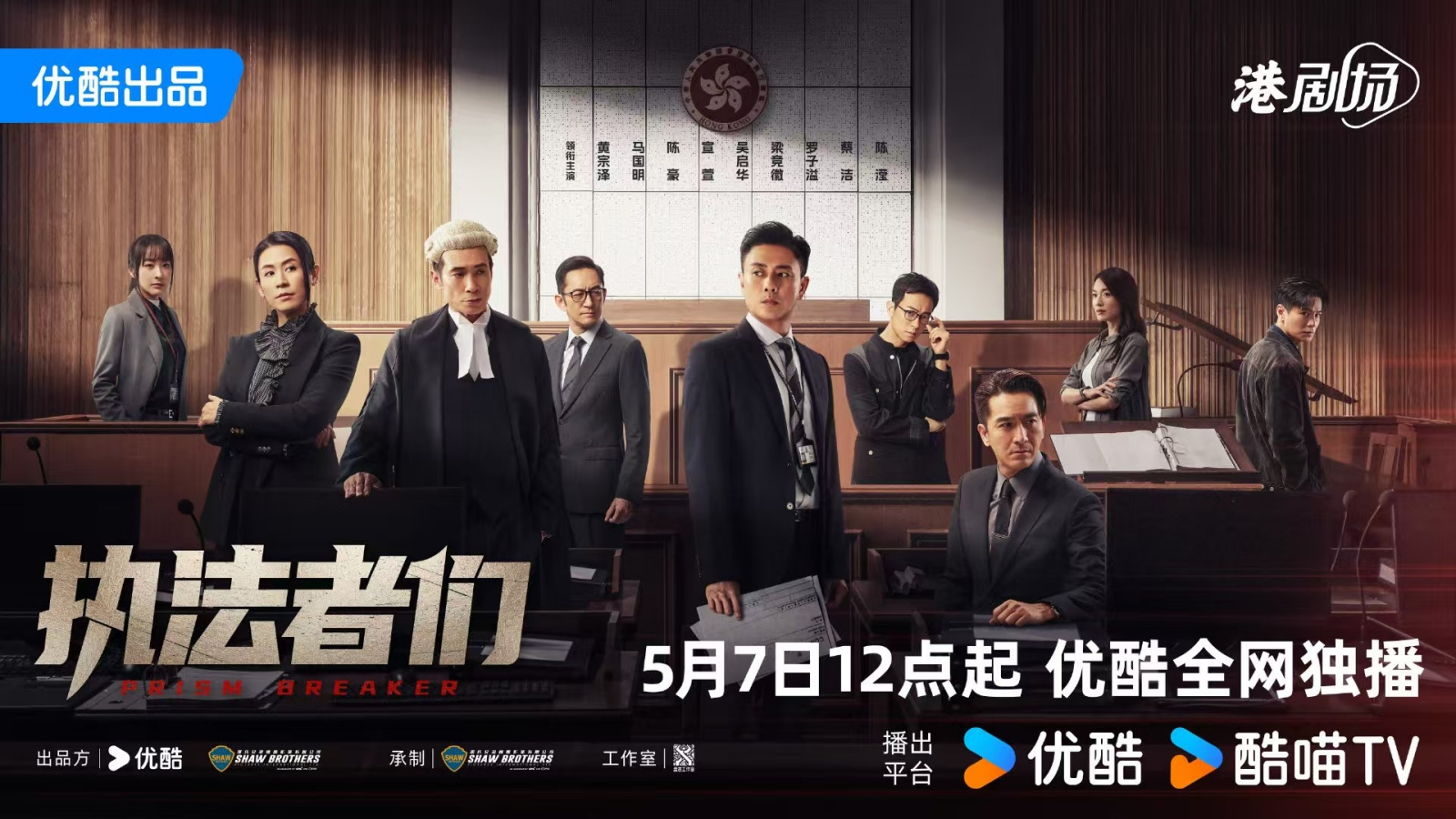
The TVB female revenge drama "Black Moonlight," starring Yang Qianyao (Yang Yi) and Wang Haoxin, has received a fairly positive response after airing on Youku's exclusive backend, though its reputation is rather mediocre. Some viewers initially thought "Black Moonlight" was a remake of "Dark Glory," but in fact, it is an original drama. However, thematically, it shares a similar core spirit with "Dark Glory": focusing on the revenge of "evil women." From last year's "Queen of News" to the same team producing "Black Moonlight," the waning Hong Kong dramas can only intermittently rely on "evil women" to boost morale.

Poster of "Black Moonlight"
At the end of last year, "Queen of News" was a hit, causing some viewers to optimistically hope it would mark a resurgence for Hong Kong dramas; however, it has since been proven otherwise. Nowadays, many viewers watch TVB dramas at a frequency of just one or two a year, meaning Hong Kong dramas have dwindled to a precious few that are topical, trendy, and worth watching.
A simple review of the Hong Kong dramas aired on TVB from "Queen of News" to "Black Moonlight" shows a diverse range of genres. There are TVB's signature workplace dramas "Flying Diary" and "Business Tycoon," period detective comedies "King of Judges," fantastical Republican dramas "Main Body," urban emotional dramas "After Marriage" and "Goodbye, Pillow Partner," police and crime suspense dramas "Anti-Heavenly Case 2," "Forensic Pioneer 6," and "Anti-Black Heroes," touching family dramas "God's Child," family business wars in "The Heirs of Family Glory" (which TVB only purchased the rights for), and more... Aside from "After Marriage" with a Douban score of 7.8, and "Business Tycoon," which hasn't scored yet, others linger around 6 points.
It's not that viewers are being overly critical; the works are genuinely mediocre. The underlying issues trace back to TVB's lack of funds, talent drain, lackluster scripts, and poor production quality, with most actors lacking the ability to carry significant roles... It's undeniable that modern TVB dramas are outclassed by mainland series across every genre. Even the once elite TVB workplace dramas have lost their charm.
There was a common viewpoint in the past: that cooperation between TVB and mainland productions has led to today’s Hong Kong dramas being hamstrung and unable to thrive. This notion might be somewhat misleading. If we say that TVB's non-co-produced dramas continuously produce quality, while co-productions are consistently poor, it's somewhat understandable for audiences to critique these co-productions. The current reality is, TVB's original dramas often feel more "crude" compared to their co-productions—due to the absence of funding, poor scripts, and subpar production values. Co-productions at least have money behind them, allowing for the return of popular stars to make significant series like "Queen of News" or "Black Moonlight."
Hence, the issue is not with co-productions; it's an internal issue with TVB itself.
From "Queen of News" to "Black Moonlight," co-productions have played a crucial supplementary role for Hong Kong dramas, filling a gap that current mainland dramas still leave—largely lacking revenge narratives in contemporary urban contexts. Through co-productions, TVB can cater to this gap in viewer demand from mainland audiences.
Returning to "Black Moonlight." Eighteen years ago, Yu Manyue (played by Yang Qianyao) and her sister Yu Xichen were assaulted by wealthy heir Jiang Jijun (played by Ma Zhiwei), who then pushed them off a cliff. Yu Xichen suffered severe trauma and became disabled. Their parents sought justice for their daughters but were wrongly accused, leading to their untimely deaths. This series of misfortunes completely shattered Yu Manyue’s life and destroyed her family.

Yu Manyue (played by Yang Qianyao)
Filled with deep-seated hatred, Yu Manyue embarks on a path of vengeance. After enduring years of hardship, she becomes one of Hong Kong's top public relations experts, using her intelligence and cunning to get closer to the Jiang family, vowing to make Jiang Jijun and his accomplices pay for their crimes.
Zhuo Huiyun (played by Lin Xiawei), daughter of the Zhuo family and daughter-in-law of the Jiang family, was Yu Manyue's childhood friend. She appears innocent but is actually twisted inside, willing to stop at nothing for personal gain. She orchestrated the death of the real Zhuo family's daughter to steal her identity and devised the tragedy that Yu Manyue and her sister suffered years ago. Eventually, Yu Manyue discovers that Zhuo Huiyun is her ultimate target for revenge…

Zhuo Huiyun (played by Lin Xiawei) is the true evil woman
The primary draw of "Black Moonlight" lies in Yang Qianyao’s portrayal of the "evil woman." Traditionally, female protagonists are often depicted as gentle, virtuous, and submissive, playing passive roles within family and society. Yu Manyue is completely different. She is a glamorous, resourceful public relations expert who harbors a deep-seated hatred for her enemies and remains unwavering in her quest for revenge.
Yu Manyue is not "Yao Jinling"; her evil nature is not malicious or sinister. Nor is she "Liu Sanhao"; Yu Manyue understands that in this unjust world, pure justice and kindness struggle to stand, and thus she utilizes every resource available—relationships, intelligence, and even lies and deceit—to fulfill her revenge.
When it comes to pure, mindless satisfaction, "Black Moonlight" actually surpasses "Queen of News."
Firstly, the revenge plot is clearly defined. Yu Manyue’s image as a cold, resolute, and brave "evil woman" is itself a bold expression of female subjectivity. Her quest for revenge is entirely based on her personal desires and choices, unrestrained by others or societal norms. As a seasoned actress known for her classic portrayals of "evil women" in TVB dramas, Yang Qianyao’s exceptional performance adds depth to the role, particularly when confronting the cold, calculated hatred towards her enemies. Her portrayal resonates strongly.

Witnessing her enemy perish before her eyes, Yu Manyue smirks
Secondly, the motivation for revenge is believable. Eighteen years ago, Yu Manyue suffered from a devastating loss, making her revenge motivations extremely powerful; audiences can deeply feel her pain and rage.
Moreover, the means of revenge are strategic (at least they appear to be). Yu Manyue utilizes her professional advantage—as a PR expert—to plan, with each enemy facing a different form of retribution that is profoundly satisfying. For corrupt police, she exploits their police-protecting son to expose their crimes, leading to their demise before their son's eyes; Jiang family's henchman, the Father and Son Kuang, sees the son inadvertently kill the father; the Jiang family faces ruin, leading to infighting…

Yu Manyue's revenge is immensely satisfying
In addition, her revenge has boundaries. Although Yu Manyue’s acts of revenge carry a personal vendetta, they also bear a sense of justice. For instance, Yu Manyue adheres to a certain moral standard, intentionally avoiding harm to innocents; her targets are not only specific evildoers but also the corrupt social system and power structures.

"Evil women" somewhat manage to revitalize the dwindling Hong Kong dramas. While mainland dramas like "Ink Rain in the Clouds" also feature similar revenge narratives with "evil women," most are set in ancient times. In contemporary settings, there is little room for a character like Yu Manyue—“personal vendettas” are explicitly forbidden, and “evil women” who violate laws will inevitably face legal consequences.
In TVB modern dramas, there are often extremely compelling and dynamic "bad men" or "evil women." Besides a relatively tolerant creative atmosphere, another reason for this is the unique circumstances of Hong Kong—it balances modern and pre-modern/"feudal" aspects. On one side, Hong Kong is a highly modernized international metropolis, showcasing the prosperity and vitality of modern civilization; on the other side, beneath the glossy exterior, it retains many remnants of feudal thought and behavior.
For example, the wealthy families in Hong Kong dramas reside in large villas, dressed stylishly, frequenting upscale venues, and engage in stock market intrigues, seemingly fully integrated into the rhythms of modern urban life. Yet within these families, traditional concepts of hierarchy, lineage, legitimacy, marriage alliances, and aristocratic background act as invisible chains, constraining the thoughts and actions of family members. This clash and coexistence of the modern and the feudal are unique to Hong Kong's socio-cultural context, endowing its business and family dramas with a rich "curiosity" flavor.

Older entrepreneurs in TVB often carry remnants of feudal thinking
The Jiang and Zhuo families in "Black Moonlight" represent Hong Kong’s aristocratic clans with immense business influence, yet they also uphold many traditional feudal customs. Their family structure reflects a typical feudal patriarchal system, where elders hold absolute authority over juniors, and family decisions, especially those involving marriage and inheritance, are often made solely by the head of the family. For instance, Zhuo Huiyun’s marriage to Jiang Jijun is more so based on the interests of both families than her personal desires; even the fiercest business wars are often overshadowed by the dynamics of legitimacy, resulting in reliance on underhanded methods and brawls…

High-stakes family business wars often resort to the most primitive tactics: a wife poisoning her husband to allow her son to inherit the company...
This coexistence of modernity and pre-modernity in TVB dramas is also reflected in their dramatic portrayal of rule of law in Hong Kong. As a city recognized globally for its rule of law, Hong Kong's legal system is known for being sound, transparent, and efficient. However, in some TVB dramas, particularly in revenge narratives like "Black Moonlight," there often exists a narrative design where the wealthy and criminals appear to easily escape legal ramifications. This primarily serves the need for sensational plotlines, resulting in almost all case-related segments in "Black Moonlight" feeling "dumbed down."

Yu Manyue’s critiques are valid; the investigation elements in the drama are far-fetched
Thus, "Black Moonlight" offers a specific brand of revenge that only Hong Kong dramas can provide. Mainland audiences are aware that the plot is unrealistic, yet it still offers a unique viewing experience. Against the backdrop of dwindling Hong Kong dramas, it seems that only such "curiosity-driven" productions rooted in the Hong Kong social context can carve out a niche.
A bit of "curiosity" is acceptable, but "Black Moonlight" clearly doesn't reach the level of a fine series worthy of deep appreciation.
As a co-production, with funding from the mainland, the production quality of "Black Moonlight" already far exceeds that of numerous other Hong Kong dramas that solely air on TVB. However, several


